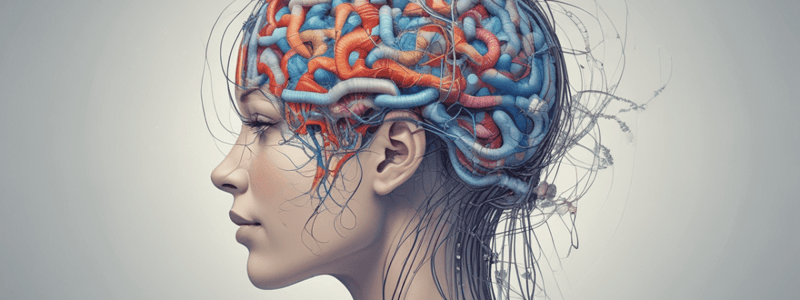Podcast
Questions and Answers
What is the primary advantage of using standardized terminology for EEG background activity in critically ill patients?
What is the primary advantage of using standardized terminology for EEG background activity in critically ill patients?
- It provides etiological information about the patient's condition
- It is only useful for patients with a specific diagnosis
- It allows for consistent reporting of frequency, amplitude, reactivity, and sleep-state transitions (correct)
- It is a substitute for the clinical exam in assessing altered mental status
What does EEG background activity provide in critically ill patients with altered mental status?
What does EEG background activity provide in critically ill patients with altered mental status?
- A replacement for neuroimaging studies
- Definitive diagnosis of neurological disorders
- Complementary information to the clinical exam (correct)
- Prognostic information only in certain situations
Why is EEG reactivity important to assess in encephalopathic patients?
Why is EEG reactivity important to assess in encephalopathic patients?
- It provides information on the patient's sleep patterns
- It is a non-specific finding with no clinical significance
- It is only useful in patients with certain medical conditions
- It provides important prognostic information (correct)
What is the primary purpose of monitoring EEG background activity in critically ill patients?
What is the primary purpose of monitoring EEG background activity in critically ill patients?
What organization's standardized critical care EEG terminology is used in this chapter?
What organization's standardized critical care EEG terminology is used in this chapter?
In what situations does EEG background activity provide important prognostic information?
In what situations does EEG background activity provide important prognostic information?
What is a key component of EEG background assessment?
What is a key component of EEG background assessment?
Why is the use of standardized terminology important for EEG interpretation in critically ill patients?
Why is the use of standardized terminology important for EEG interpretation in critically ill patients?
What is the relationship between EEG background activity and the clinical exam in assessing altered mental status?
What is the relationship between EEG background activity and the clinical exam in assessing altered mental status?
What is the frequency specified for documenting the posterior dominant rhythm?
What is the frequency specified for documenting the posterior dominant rhythm?
How should the presence of reactivity be recorded?
How should the presence of reactivity be recorded?
What is the breach effect in EEG background?
What is the breach effect in EEG background?
How should the EEG background be compared in the left and right hemispheres?
How should the EEG background be compared in the left and right hemispheres?
What is the significance of documenting the presence or absence of transitions in background frequency and amplitude?
What is the significance of documenting the presence or absence of transitions in background frequency and amplitude?
What is the correct classification of the predominant background frequency?
What is the correct classification of the predominant background frequency?
How should amplitude be recorded?
How should amplitude be recorded?
What is not considered a reactive response in EEG activity?
What is not considered a reactive response in EEG activity?
What happens to the frequency bands if two or three are present?
What happens to the frequency bands if two or three are present?
Flashcards are hidden until you start studying
Study Notes
EEG Background Activity in Critically Ill Patients
- EEG interpretation in critically ill patients is most helpful when standardized terminology is used with consistent reporting of frequency, amplitude, reactivity, and sleep-state transitions.
Importance of Monitoring EEG Background Activity
- Monitoring EEG background activity provides a real-time window for monitoring changes in global cerebral function.
- EEG background activity provides important prognostic information in certain situations.
Terminology for Describing EEG Background Activity in ICU
- EEG background should be compared in left and right hemispheres and identified as either symmetric, mildly asymmetric, or breached.
- Presence or absence of breach effect should be noted.
- Posterior dominant rhythm should be specified as present or absent, with documentation of frequency to the nearest 0.5 Hz and presence of reactivity to eye opening and closure.
Key Components of EEG Background Assessment
- Predominant background frequency: delta, theta, or alpha; if two or three frequency bands are present, record each one.
- Variability: record as yes/no or unclear based on presence or absence of transitions in background frequency and amplitude.
- Reactivity: record changes in cerebral EEG activity to stimulation, including changes in amplitude or frequency, and attenuation of activity.
- Amplitude (voltage): record as normal, low, or high.
- Symmetry: compare EEG background activity in left and right hemispheres and identify as symmetric, mildly asymmetric, or breached.
Studying That Suits You
Use AI to generate personalized quizzes and flashcards to suit your learning preferences.





